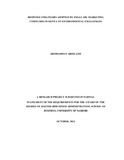| dc.description.abstract | The objective of the study was to establish the response strategies adopted by Small Oil
marketing companies in Kenya to environmental challenges. The study was a crosssectional
survey design. The cross-sectional design was preferred to other designs since it
is the most commonly used form of survey design when data is to be collected at one
point in time across many firm. The target population in this study was the oil marketing
firms in Kenya. According to Energy Regulation Commission‟s website, there were 36
Small oil marketing firms in Kenya as at 30th June 2014. These firms were therefore the
population of the study. Since the number was not so large, all the 36 firms were included
in the sample. This was therefore a census survey. This study used primary data. The data
was collected using structured questionnaire on the basis of the objectives of study. After
collection of data, it was analyzed using SPSS. Descriptive analysis method was used to
analyze the collected data. The statistics used was percentages, mean and standard
deviations. The results were presented in form of charts and tables where appropriate for
ease of interpretation. Results indicated that response strategies considered in the event of
environmental challenges were; focus market, cost leadership strategic alliances and
corporate social responsibility. Acquisition and mergers lobbying the government were
least pursued response strategies to environmental challenges. The strategies which were
used to a large extent were focus and cost leadership. The study finds that response
strategies with a high impact to environmental challenges were; corporate social
responsibility and cost leadership. The results revealed that the strategic combinations that
best suit the small oil marketing companies were; differentiation and low cost leadership,
and differentiation and market focus while the strategic combinations that least suit the
small oil marketing companies were corporate social responsibility and lobbying the
government and corporate diversification and acquisitions and mergers. In line with the
above findings the study concluded that response strategies play a very crucial role in
environmental challenges and more specifically, it was concluded that among the
response strategies that affected strategy implementation were focus market, cost
leadership, strategic alliances and corporate social responsibility. Based on the above
findings the study recommends that in order to tackle the environmental challenges
facing the small oil marketing companies then the following strategies should be pursued
by the players in the sector. For policy purposes, the study recommend that, organizations
should conduct environmental scanning to be aware of different challenges in the
environment and that an organization should apply corporate strategies, business
strategies and functional strategies in response to environmental challenges. The study
further suggests that since this study focused on only small oil marketing companies
which represented a small percentage of the oil industry, further studies should be
conducted on other organizations in the industry to establish the correlation. The study
also suggests that further studies should focus on other industries such sugar and
construction industries. | en_US |

